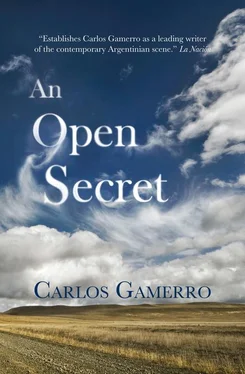“YOU LEAVING FEFE?” Leticia asks me when she sees me getting my bag together.
“Yes. I’m taking the four am to Rosario, they leave every hour for Buenos Aires from there so I’m told. It’s the first one that passes isn’t it?”
“The La Verde bus? Yes. There’s another at five-thirty I think.”
“Two. But I’ve already bought my ticket for this one,” I reply, wrestling with the zipper.
“It’s really got to you about your granddad hasn’t it. Guido told me.”
“Yes. No,” I lie, I’m not sure with which word. “I miss home too. I rang from the terminal and when Guille answered I actually got a lump in my throat. And there’s such a hoo-hah here over this whole business, it’s all getting a bit much to be honest. I may come back later on, I don’t know. I need to stop and think for a bit. And I’ve found out everything I wanted to. I don’t want to talk to anyone else, I get the feeling I know what they’re going to say.”
“Are you stopping for dinner?”
“If that’s all right with you. We’ll have a send-off.”
She waits by the door a little longer out of politeness, and I’m about to tell her not to put herself out and to get on with her things when the tooting of a car horn makes us jump. Through the window we’re dazzled by the battery of full headlights from Guido’s Fiat Uno, who’s already walking in through the front door.
“Sayago’s shown up. The ex-cop,” he announces exultantly. “He’s waiting for us at the bar,” he says coming inside and he sees my bag on the bed. “Where are you going?” he asks me.
“I’m leaving. I decided a while ago,” I reply, stating the time.
“There’s still time then,” he says to me dragging my by the arm towards the door he left open when he came in. “We’ve got more than enough time till four in the morning.”
DAILY LIFE IN MALIHUEL hasn’t changed radically since my last visit, so it isn’t hard to reconstruct what an average day would have been like, twenty years back. To be more illustrative let’s choose a weekday; to avoid being too abstract let’s say a Friday; and let’s put that Friday somewhere towards the end of February — Friday twenty-fifth February 1977. We can place our ideal observer high up at the top of the church spire, from where he would be able to observe everything — all four points of the compass — that goes on in the streets and, in less detail, at the lagoon’s beach resort; and for what’s hidden under the tops of the trees or in the interiors of the houses, imagination or memory should be enough, as this is an observer who has the essential rhythms of town life written on their body.
The day begins at night, as is the norm in towns in Argentina’s interior, even in summer. A light comes on — at the Trigo Limpio Bakery. A light goes out — at the police headquarters one dozy officer has replaced another sleeping officer and doesn’t want the light to keep him awake. Half a block away the drying fans of the pasta factory commence their non-stop drone, wafting their egg-and-flour breath onto the street. At 4.45 am — if it’s on time — the Los Cardales bus from the towns to the south swings onto Veinticinco de Mayo Avenue. These days it stops at the New Terminal, but twenty years ago it would have driven on for two more blocks, as far as the corner of Los Tocayos, where a shadowy figure gets off, its human form disappearing into the surrounding shadows never to be seen again. Forty minutes later the Chevallier from Bullock follows the same route and, when it sees no sign of a passenger standing on the corner, heads straight on down the Fuguet road, bound for Rosario. Impressions: a watery light spreading from the east, the air still, and cool for the last time in the day, the acoustic depth of the space measured in all directions by the crowing of cocks and echoed by the street lights, as sector after sector of the local grid clicks off. In the uncertain light the tarmacked streets are filled with the silent traffic of bicycles, mainly from the Colonia, converging on the open gates of the Tuttolomondo factory. Down the same street, from the lagoon, lurches the milkman’s trap, laden with dented, presumably full aluminium churns. In the gardens of each house it stops at, a covered jug has been waiting since the night before. The sky is criss-crossed by the shooting silhouettes of birds and everywhere the grass bends under the weight of the dew.
About seven, as the sun plucks the first rays off Comandante Pedernera’s bronze kepi, the La Capital truck from Rosario via Fuguet and the La Nación truck from Buenos Aires pull in at opposite ends of town. The first drops off the pile of newspapers outside the Casaricos’, the other at the hallway of the Dupuys, who will distribute it to whoever has ordered it. Fifteen minutes later the Central Alcorta bus arrives from its namesake, bound for Elordi and Toro Mocho; at most one dozy passenger gets off and steers their elongated shadow towards the houses, if they’re from town, or as far as a bench in the square to wait for the shops or offices to open if they aren’t.
By half-past seven no dew is left, except at the bases of the thickest patches of weeds, and in the sun-warmed treetops the cicadas start up their tentative drone. Until then the town has just been stretching and yawning, but now it wakes up properly. Lots of people on foot, a few cars, the odd motorcycle fill the streets; a couple of weeks later and there’ll be more activity because the start of classes will add the gleaming white of school pinafores to the bright light of day. The two banks and two service stations open, a few businesses and all the public offices. A handful of cars from neighbouring towns pull up outside the Courts, the police headquarters or the all-purpose building that houses the Inland Revenue, the Civil Registry and the Justice of the Peace’s Office. The traffic is fluid because the number of people or vehicles is never large enough for queues or traffic jams to form. Delivery trucks arrive from neighbouring towns and Malihuel sends them its own in return, with the logo of the globe and the question “What kind of delicious pasta shall we eat today?” painted on the grooved metal sides of the trucks. An hour later all the shops are open, the cemetery, the telephone exchange — still called Entel in those days — and the Post Office. This is also the time when the hotel kitchens and dining rooms come to life, with tourists and townsfolk wanting an early breakfast to make the most of the day, which promises to be a bright one: the Malihuel Grand Hotel and the Las Delicias on the square, the Los Tocayos hotel-restaurant and above all the Lagoon Hotel, towards which the trucks and vans that have finished their deliveries in the Colonia and the town advance, along the causeway across the glittering water. The stationmaster opens up his office and waits for the freight train to pass through, and at the now abandoned power plant the nightwatchman sets off for home and sleep, after a few matés with the two daytime operators.
By around nine o’clock, when the metallic sawing of the cicadas thickens the air, the heat really has begun to kick in. The Clarín van arrives and drops off its bale of newspapers — the bulkiest — outside the kiosk-cum-photocopier’s on the corner opposite the Courts. Half-an-hour later, the mail van leaves one canvas sack on the opposite corner and picks up another. By that time the bicycle traffic is all children, who also bring the playground in the square to life. Today being the last Friday of Carnival, many of them are equipped with squeezy bottles and water bombs. In kitchens the length and breadth of town, mothers are washing up the breakfast things and beginning to fill polystyrene coolers with pop, sandwiches, tomatoes and hard-boiled eggs for a day out at the lagoon. On the basketball and tennis courts of the Yacht Club the chairman switches the swags of coloured light bulbs on and off to make sure everything’s in working order for the dance that night. A patrol car carrying arrests from other towns pulls up around the back of the police headquarters and toots its horn outside the jailhouse gates. Behind it, while it waits, an orange Chevy coupé chugs and lurches beetle-like down the tarmacked street, turns right at the corner and, after two more gruelling blocks, stops outside a house with a slate-inlaid façade overlooking the square. A figure gets out on the passenger side, shades his eyes from the glare of the sun with one hand and opens the door, without a key. Before going inside he turns round and waves to the occupants of the car, one of whom is in the process of clambering from the back into the recently vacated front seat. The car pulls off with the door still open and one foot sticking out, and over the noise of the engine comes a confusion of intermingled laughter and swearing. The two doors — the car’s and the house’s — slam shut at the same instant.
Читать дальше












